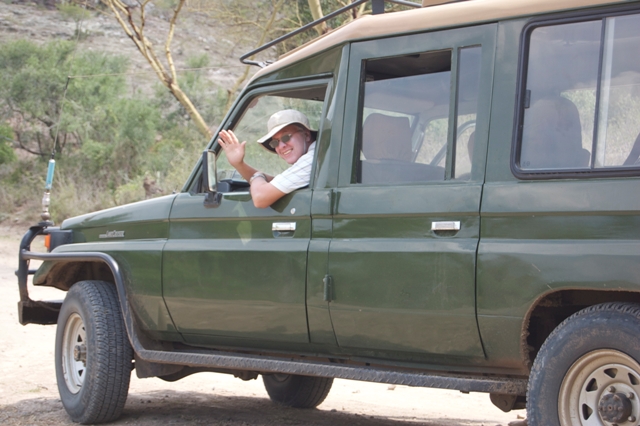Baylor University Geologist Dr. Steven Driese Named Fellow of the American Association for the Advancement of Science

Dr. Driese at Rusinga Island, Kenya - photo courtesy of Lauren Michel
Follow us on Twitter: @BaylorUMediaCom
Media contact: Frank Raczkiewicz , (254) 710-1964
WACO, Texas (Nov. 29, 2012) - Steven Driese, Ph.D., professor and chair of the department of geology at Baylor University's College of Arts & Sciences, has been named a 2012 Fellow of the American Association for the Advancement of Science (AAAS). Election as a Fellow is an honor bestowed upon AAAS members by their peers.
Driese was honored for his "distinguished contributions in the field of paleopedology and relating modern soil analog systems to ancient soils (paleosols) used for reconstructing ancient climates," according to the AAAS.
"Dr. Driese's research has established him as a leader in his field," said Dr. Elizabeth Davis, executive vice president and provost at Baylor University. "This honor is truly deserved and places him among an elite group of scientists."
In 2011, Driese was among the group of scientists involved in discovery of the oldest archaeological evidence of human occupation in the Americas at a Central Texas archaeological site located about 40 miles northwest of Austin.
"Steven Driese's research discoveries and professional leadership have had an enormous impact on the field of sedimentary geology," said Lee Nordt, Ph.D., dean of the College of Arts and Sciences. "He has revolutionized our ability to detect and interpret biogeochemical signatures in ancient landscapes. His research has deepened our understanding of the evolution of early vascular land plants, ancient atmospheric compositions, and the importance of using modern analogs in the construction of climate proxies."
New Fellows will be presented with an official certificate and a gold-and-blue (representing science and engineering, respectively) rosette pin on Feb. 16 at the AAAS Fellows Forum during the 2013 AAAS Annual Meeting in Boston, Mass.
"I am deeply honored in being named a Fellow of AAAS and for having been recognized for my long-standing efforts at interpreting the geologic record of past climate, landscape and atmospheric chemistry using modern analog soil systems," Driese said.
Driese was a member of the faculty at the University of Tennessee, Knoxville for more than 20 years before joining the Baylor faculty in 2004 as professor and chair of the department of geology. He has published more the 75 papers in peer-reviewed journals.
As an expert in paleopedology, clastic sedimentology and environmental sedimentology, Driese's current research includes conducting climate and landscape reconstructions of wetland-floodplain-lake and lake-margin systems in the Pleistocene-Holocene of East Africa; interpreting the late Pleistocene-Holocene climate record of Pleistocene-Holocene floodplain soils and paleosols in the middle Atlantic and Southeastern U.S. using stable isotopes of soil organic matter and investigating the late Pleistocene-Holocene climate record of Central Texas. Driese is a member of the Geological Society of America, the National Association of Geoscience Teachers, Sigma Xi and the Soil Science Society of America.
He received his bachelor's degree from Southern Illinois University and his master's and doctorate from the University of Wisconsin-Madison.
This year, 702 members have been awarded this honor by AAAS for their scientifically or socially distinguished efforts to advance science or its applications.
ABOUT BAYLOR UNIVERSITY
Baylor University is a private Christian University and a nationally ranked research institution, characterized as having "high research activity" by the Carnegie Foundation for the Advancement of Teaching. The University provides a vibrant campus community for approximately 15,000 students by blending interdisciplinary research with an international reputation for educational excellence and a faculty commitment to teaching and scholarship. Chartered in 1845 by the Republic of Texas through the efforts of Baptist pioneers, Baylor is the oldest continually operating University in Texas. Located in Waco, Baylor welcomes students from all 50 states and more than 80 countries to study a broad range of degrees among its 11 nationally recognized academic divisions. Baylor sponsors 19 varsity athletic teams and is a founding member of the Big 12 Conference.
ABOUT BAYLOR COLLEGE OF ARTS & SCIENCES
The College of Arts & Sciences is Baylor University's oldest and largest academic division, consisting of 26 academic departments and 13 academic centers and institutes. The more than 5,000 courses taught in the College span topics from art and theatre to religion, philosophy, sociology and the natural sciences. Faculty conduct research around the world, and research on the undergraduate and graduate level is prevalent throughout all disciplines.
ABOUT AAAS
The American Association for the Advancement of Science (AAAS) is the world's largest general scientific society, and publisher of the journal, Science as well as Science Translational Medicine, and Science Signaling. AAAS was founded in 1848, and includes 261 affiliated societies and academies of science, serving 10 million individuals. Science has the largest paid circulation of any peer-reviewed general science journal in the world, with an estimated total readership of 1 million. The non-profit AAAS is open to all and fulfills its mission to "advance science and serve society" through initiatives in science policy, international programs, science education, and more.